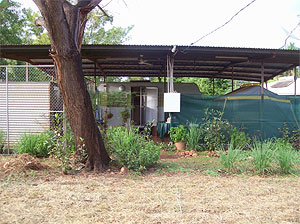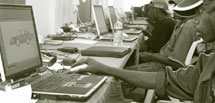Current Projects
Project Update October 2008
In February 2007 the anticipated installation of the satellite dish on the tin shelter went ahead and a radio connected to the modem allowed us to use the internet in a tent - which shared the space under the shelter with the caravan. We called it the iNet Café and it ran for the next 10 months. We had a Tablet notebook on loan from the university for our iNet use and an old PC running Windows 97 from the school for games.
My records show that 156 people used the iNet Café for computer use, one way or another, even if that just included accompanying someone who did use the computers. And that’s not counting the endless cups of tea and conversations and colouring and reading which also went on. It was an easy space for Yolngu to come and go from as it was never locked, even though there was a fence to keep in my dog.
The records show 641 ‘computer encounters’ and 467 uses. The most popular of these uses were internet banking, general iNet use - especially buying music from iTunes and subsequently listening to it - and playing games. The games included the inevitable card games and eventually the addictive game of ‘bubbles’, but also several old computer games which ran on Windows 97. The old war horse of a PC took plenty of use and dust and keep on rebooting every time an inexperienced kid found a way to thwart it. The ‘games’ were simple jig saws and memory games, and included collections of pictures of animals which the smaller kids, not yet addicted to fast moving interactive games, still found fascinating.
It took longer to find a home for the Knowledge Centre. After several disheartening attempts to share public spaces with the Council we were finally delivered a gift, curtesy of the ants, which ate out the power in the crumbling old Council building and forced a move which had been procrastinated for years. It still took a few months before we were able to set up shop in a pair of portables but we then offered another public access iNet point. By this time the Council too had a public access computer in its new space, and the Women’s Centre computer continued to function, albeit intermittently. This gave us four potential points of iNet access and in all seven computers. One of them, in the Knowledge Centre, was dedicated to the use of the database, ‘Our Story’, provided by our funding organization, NTLIS. It had been set up in August that year with photos from the NT archives of a Ramingining school trip in the 1980s. It proved to be a wonderful way to introduce people to this kind of archiving and public access to digital resources.
However, like all stories, there were climaxes and declines. As my field work drew to a close in November I handed over to a new person in the town, who seemed keen to be involved with computing. It proved too challenging over the ensuing 5 months .. living in the caravan in the wet season and working in an indigenous town without any former experience or relationships. This period coincided with the arrival of the NT Intervention legislation re the surveillance of public computers and the other difficulties became subsumed into this rationale. The Council CEO and the ‘new guy’, between them, shut down most of the iNet access. There was conciliatory talk of the much better facilities which were planned for the future.
I returned for two months in June and revived the iNet Café for this period, but with the new surveillance regulations and a cumbersome method for getting a password, the iNet use had plummeted. People had resorted to other ways to do their banking and the young people had mobile phones for listening to music!
I am currently writing up this story. As I said at the outset, it is a story about the computer in Ramingining, but it has something to say more generally: ‘When something happens in Ramingining, what is happening?’ Or rather, What sorts of things are happening? My hope is that the story will be useful in thinking about how people like myself - Balandas involved in community development projects - do or could or even should behave in these roles. I want to open up the debate about digital divides and access and resource allocations to include more of the actors which are too often neglected, but which can play such important roles, sometimes the deciding roles, in whether things actually happen or not.
For the future I am interested in returning to some involvement with computer access and its use in Ramingining. For example there is some exciting work being done at both CDU and ARDS on several fronts, developing online literacy programs for both English and Yolngu Matha. These would be exciting projects to link up with other access projects which might be tried in remote communities in the future.
My email address is anthea.nicholls@cdu.edu.au and
I’d love to talk with fellow travellor researchers.
Latour, B. (2005). Reassembling the Social: An Introduction to Actor-Network-Theory. Oxford, Oxford University press.

The caravan and iNetCafé tent under the shelter, with the satellite dish just visible top right.
(I have lots of great pictures of folks using it but need to get permission to use them.)

